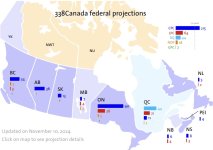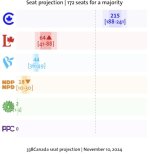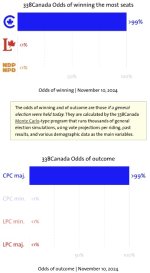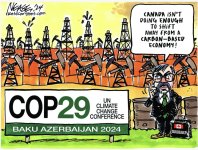How global warming fried the Trudeau Liberals
Author of the article:Lorrie Goldstein
Published Nov 09, 2024 • 4 minute read
Ever since coming to power in 2015, Prime Minister Justin Trudeau and the Liberals have fervently believed their climate change and carbon tax policies would make the Conservatives unelectable, as long as Canada’s official opposition party refused to come up with its own plan.
For a time they were right. After all, if you didn’t care about reducing Canada’s industrial greenhouse gas emissions to save the planet — as the Liberals would allege whenever anyone criticized their policy — what kind of a climate-denying, planet-destroying dinosaur were you?
But what the Liberals didn’t anticipate was that their absurd justification of their climate policies — that Canadians paying higher taxes for gasoline and heating their homes in winter would prevent flooding and hurricanes not just in Canada, but globally — would eventually collapse under its own weight.
That’s because at 1.5% of global emissions nothing Canada does can materially impact climate change.
We could reduce our emissions to net zero tomorrow and it would have no effect, while countries like China and India continue to drive up global emissions primarily by burning coal — the most carbon intensive fossil fuel — to produce electricity.
Given a choice between not having a climate policy and having one with no discernible impact on climate change, while making life more expensive for everyone and throwing into doubt the livelihoods of hundreds of thousands of Canadians employed in Canada’s oil and gas sector, a growing number of Canadians have chosen option “a”.
While some reject the science of climate change, a much larger group simply believes that paying more in taxes is not going to save the planet, a view bolstered by a report released by federal environment commissioner Jerry DeMarco last week that audited the Liberals’ Canadian Net Zero Emissions Accountability Act.
It concluded that the Liberal government’s lack of transparency in implementing this legislation makes it impossible for the average citizen to understand, much less believe, the Trudeau government’s claim it will reduce Canada’s emissions by 40% to 45% below 2005 levels by 2030, on the way to net zero by 2050.
The government says that the 149 measures contained in its approach to addressing climate change will achieve a 36.2% reduction in emissions compared to 2005 levels by 2030, implying that all that is needed is a final push to reach at least 40%.
But this claim is nonsense based on DeMarco’s finding that to achieve the 40% minimum target will require huge increases in annual emission cuts in the next six years, which the government has come nowhere close to achieving in the past nine years.
As of 2022, the latest year for which government data are available, Canada’s emission were 7.1% below 2005 levels, meaning it has achieved 17.8% of its minimum target in nine years and now has six to achieve the remaining 82.8%.
DeMarco said while reaching the 40% to 45% reduction target is still achievable and should be pursued, his own findings indicate why it is all but impossible to believe this will happen.
For example, when DeMarco’s auditors examined 20 of the government’s 149 measures to reduce emissions, it found only nine were on track to achieve their goals, while nine others were faced with challenges and two had encountered significant barriers, such as delays in setting and meeting milestone targets.
When the audit examined 32 additional reduction measures which the government claimed will help boost emission reductions from 36.2% to at least 40% by 2030, it found only seven were new, while 22 were existing measures that had already been reported. The remaining three were enhancements of existing measures.
The audit found examples where two different government programs were funding the same projects and reporting the same expected emission reductions, raising the possibility of double counting actual reductions.
DeMarco also had concerns about the computer modelling used to estimate emission reductions of various government programs, noting they weren’t updated in 2023 compared to 2022 and that some of the initial calculations were overly optimistic.
In addition, “recent decreases to projected 2030 emissions were not due to climate action taken by governments, but were instead because of revisions to the data used in modelling.”
DeMarco was also surprised by the lack of transparency and consistency across the government in assessing whether taxpayers were getting good value for money spent in reducing emissions, the costs of which it has previously reported at more than $200 billion for federal taxpayers alone.
On the issue of value for money, DeMarco found that Canada was the worst performer at lowering emissions among the G7 nations to which it belongs, including the U.S., which, unlike Canada, has never imposed a national carbon tax on its citizens.
Ever since coming to power, the Liberals have believed their climate change/carbon tax policies would make the Conservatives unelectable.

torontosun.com





